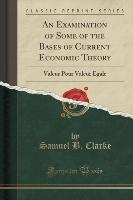An Examination of Some of the Bases of Current Economic Theory
BücherAngebote / Angebote:
Excerpt from An Examination of Some of the Bases of Current Economic Theory: Valeur Pour Valeur Égale
The bargain, is it an equation? To make the question clear, it will be convenient, without attempting to define a unit of property, to assume that such a thing exists, and that, at any instant of time, every separable item of property embodies and is measured by a definite number of such units. For example, a coin may be conceived of as containing ten property units, suppose that the owner exchanges it for another like coin of ten units, evidently both parties to the bargain stand, as property owners, just where they did before, neither is made richer or poorer by the bargain. Is this the type of the bargains which are actually made in the usual course of industry and commerce? Or do those bargains generally, if not universally, resemble each other in this, - that the property which each trader gets by the bargain is not equal to the property which he gives, but is either more or less, so that he is in some degree either enriched or impoverished by the bargain itself?
That the question is a fair one and of importance from both the scientific and the practical standpoints may be apparent if we reflect a little on certain opinions which have considerable currency and credit.
About the Publisher
Forgotten Books publishes hundreds of thousands of rare and classic books. Find more at www.forgottenbooks.com
This book is a reproduction of an important historical work. Forgotten Books uses state-of-the-art technology to digitally reconstruct the work, preserving the original format whilst repairing imperfections present in the aged copy. In rare cases, an imperfection in the original, such as a blemish or missing page, may be replicated in our edition. We do, however, repair the vast majority of imperfections successfully, any imperfections that remain are intentionally left to preserve the state of such historical works.
Folgt in ca. 5 Arbeitstagen




